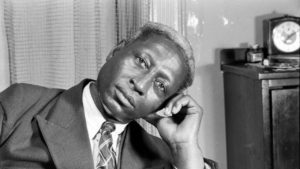Before a country like ours became standardized to death, before mass media linked and limited our goals and souls, our new world was a frontier rife with wanderers, enigmatic stragglers who embezzled, seduced and abandoned, purveyed mysteries, enlightenment seasoned with fraud wherever they set up alongside genuine visionaries, practitioners of traditional customs.

Master chronicler Huddie Ledbetter, a.k.a. Leadbelly, brings forth a character haunting the societal landscape bequeathed by Mark Twain and Faulkner: the Medicine Man. His identity was captured in a 1930s Library of Congress recording.
Before singing his first note, Leadbelly’s twelve-string Stella guitar projects its melody within a restless narrative accompaniment that opens onto an unstable world of sudden arrivals and longed-for departures. His divine perspective that gazes downward onto a populace recounts their stories before targeting a detailed description of their actions and then giving voice to the protagonist himself, all anchored by a unique rhythm that supports the momentum of lyrics and their suave delivery.
The Medicine Man
Oh the Medicine Man, [the?] Ba’,
He’s traveling through the land
Oh the Medicine Man, [a’] Ba’,
He’s traveling through the land
Got the grip in his hand, Baby,
And he’s doing the best he can
Got the grip in his hand, Baby,
And he’s doing the best he can
That was a Doctor who used to sell medicine
And got to be a blind man
And he’s sitting on side the road begging all he can
And everybody come on and seen him that knowed him
And you know that he was a good doctor
And everybody in the Black [sic?*] started to do something for the good doctor
And he had his old medicine case in his hand
And everyone invited people to come on and go on and let him know who he was
Oh the Blind Man, oh Babe,
He’s sitting on the road again
Oh the Blind Man, Baby,
Sitting on the road again
Got the grip in his hand, Baby,
Got the grip in his hand
Got the grip in his hand, Baby. . .
I’m the Medicine Man, Baby,
And I’m on the road again
I’m the Medicine Man, Baby,
On the road again
Oh I declare, Baby
I’m setting on the road somewhere
Baby I declare, Baby
I’m setting on the road somewhere
With a grip in my hand, loaded,
I’m doing the best I can
Got my grip in my hand, loaded . . .
*hard to discern this crucial word. . .
Could this song be an evocation of something Leadbelly had witnessed or heard about? Nearby Choctaw Indians had medicine men in their lives and ex-Slaves would have sought after them and anyone else for the health care that they and their descendants are still denied.
Or is this mythic narration a risque blend of truth that also opens onto an allegory for a hand-held grip residing in a Medicine Man’s trousers? Either way, he would have been in demand and this irresistible song from a remote time etches its mantra-like ritornello into you for good!
©Allan Evans 2016

Love the fluidity and uncertainty that fills this song: “I” and “He” sections, wandering bar lines (Woody Guthrie, a close associate of Leadbelly, had similarly free phrasing). Third line ending’s gotta be “oh babe”. He may well have closed his lips but stopped the air, so the final b did not register.
Is it possible that the crucial word is “block”? Yes that is an urban word, but it would seem to fit the context.
Love how he begins in a somewhat hesitant tempo, but gets his train rolling soon enough. Amazing recording!
Leadbelly had a tendency to speed up. By the time he’s finishing it’s twice as fast.